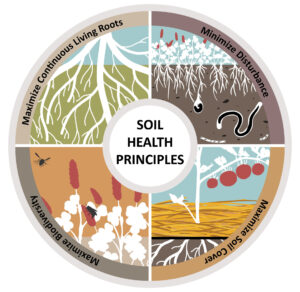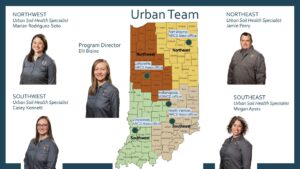Growing vegetable crops often involves utilizing our natural resources, which include the soil. Thus, maintaining the health of this asset on our farms and growing spaces is essential. There is an initiative in the state of Indiana whose mission is to improve soil health, but its focus is on Indiana’s urban and community small-scale agricultural land. This initiative is called the Urban Soil Health Program (USH) and is housed under the Indiana Association of Soil and Water Conservation Districts (IASWCD). The USH Program receives funding support from various sources, including the USDA Natural Resource Conservation Service (NRCS), some of the local Soil and Water Conservation Districts (SWCDs), and Clean Water Indiana (CWI).
This initiative offers free site visits with soil testing, workshops, farm tours, field days, technical assistance on soil health practices, and connects growers with agencies. If you think you are not part of the program’s audience, think twice because the USH Program believes that soil health is for everyone. Also, the program’s audience involves small acreage farms in urban and rural areas, diverse vegetable crop production, mixed perennial (blueberries, nuts, fruit trees)/annual crop production, and mixed vegetable/livestock production.
Examples of our primary audience:
- Market farms/gardens
- Community farms/gardens
- Church farms/gardens
- School farms/gardens
- Non-profit farms/gardens
- Institutional/commercial business farms/gardens (hospital, university, prison)
- Demo or research farms/gardens (Master Gardeners, Extension, SWCDs)
- Backyard/home gardens
The four soil health principles are at the core of the program’s work 1) minimize disturbance, 2) maximize biodiversity, 3) maximize soil cover, and 4) maximize continuous living roots (Figure 1). The program staff is trained in the practices associated with improving soil health which includes nutrient management, cover cropping, mulching, crop rotation, no-till/low-till, and native and beneficial plants and insects. You can find resources on these conservation practices in the program’s resource packet https://bit.ly/USH_Resources.
The Urban Soil Health team is comprised of five staff members: one program director and four regional Urban Soil Health Specialists (Figure 2). Each regional Soil Health Specialist is in one quadrant of the state and is based out of the NRCS Area Offices (NW-Lafayette, NE-Fort Wayne, SW-Vincennes, SE-North Vernon).
The program’s goals are trifold: 1) to enhance local partnerships to address soil health, 2) to increase the adoption of soil health management systems, and 3) to provide education to diverse farmers and gardeners. The staff provides support directly to urban, small-scale, and diverse vegetable crop producers throughout the state on soil health practices.
USH also works closely with the Indiana Conservation Partnership (ICP) and supports the local SWCDs. Each county in Indiana has an SWCD that takes the lead in outreach and conservation at the county level. The USH program provides seed funding for the districts and other local partners (i.e., growers, non-profits, Purdue Extension, and other primary audience individuals) to form working groups that provide site visits and technical assistance. These working groups also create educational materials and host educational events.
Reach out to the Urban Soil Health team to get involved with the USH Program or to receive a site visit. Soil health is for everyone, and we will work together to grow soil health on small and diverse farms everywhere in Indiana.
Elli Blaine, Program Director, IASWCD eblaine@urbansoilhealth.org
Regional Soil Health Specialists:
Marian Rodriguez-Soto (NW) mrodriguezsoto@urbansoilhealth.org
Jamie Perry (NE) jperry@urbansoilhealth.org
Casey Kennett (SW) ckennett@urbansoilhealth.org
Megan Ayers (SE) mayers@urbansoilhealth.org

